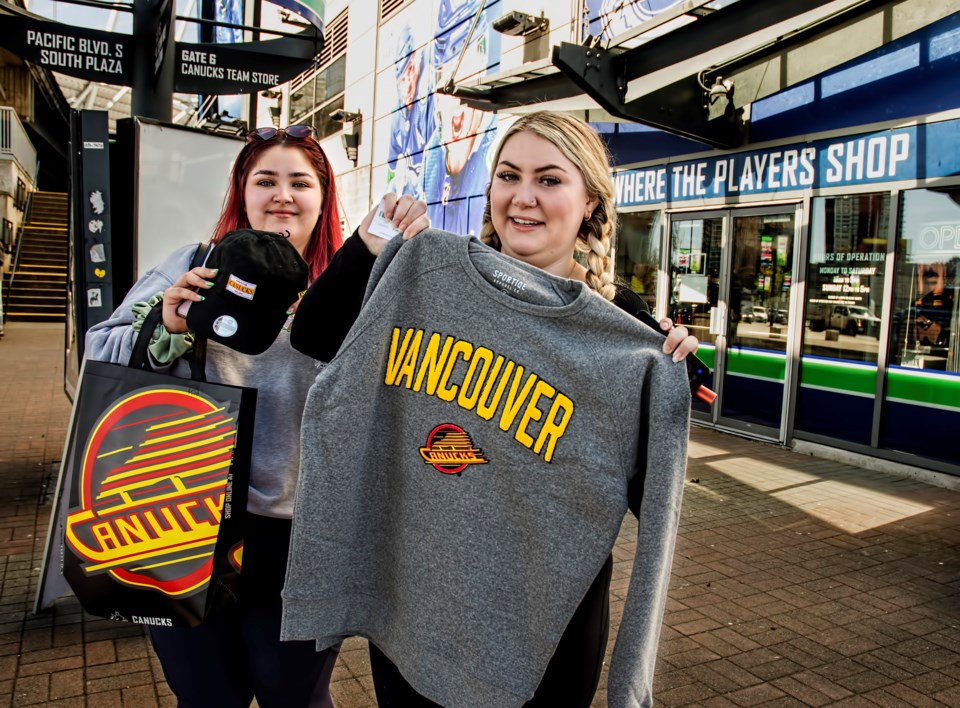Large events are set to stimulate tourism spending at venues, bars and restaurants this spring and summer. The uptick in tourism at this time of year is also set to increase hotel rates at a time when other factors are also pumping up room prices.
The Vancouver Canucks’ run in the 2024 National Hockey League playoffs has helped sales increase at bars and restaurants across the region, .
Payment processor Moneris today released data showing Vancouver bars and restaurants near Rogers Arena saw a jump in business during the first round of the NHL playoffs.
In Game 1 against the Nashville Predators, for example, spending at restaurants near the arena jumped 72 per cent, and eight per cent across the city on Sunday, April 21.
Similar business bumps took place on other game nights.
Game 2 of the Round 2 best-of-seven series between the Canucks and the Edmonton Oilers takes place tonight at Rogesr Arena. The Canucks lead that series 1-0.
"It's pretty obvious that it happens," said Ian Tostenson, CEO of the BC Restaurant and Foodservices Association (BCRFA), which conducted a study on the matter in 2015 – the last time the Canucks hosted a home playoff game.
"People go to their favourite spots about an hour before the game, and the sales of beverages and food start to go up. Then, all of a sudden, the game starts. When the Canucks score, beverage sales go up. If the Canucks don't score it gets kind of neutral. If the Canucks win, they stay longer and celebrate, and if the Canucks lose, everybody goes home."
This is the first time since 2011 that the Canucks have had quarter-finals home playoff games, given that the playoffs in 2020 were during the pandemic, and fans were not allowed inside arenas. That long dry spell for playoff games, interrupted only by a first-round loss in 2015, is likely to only increase fan interest in going to bars and restaurants to see games in group settings.
Good news for those people is that patios will be plentiful.
A silver lining of the COVID-19 pandemic is that it prompted provincial and civic governments to make it easier for restaurants to open patios.
Not only did the province virtually rubber stamp liquor-licence applications during the pandemic but the City of Vancouver enabled restaurant owners to shift indoor seating to be outdoors, Tostenson said.
"In some cases, not in all, but some restaurants could increase their capacity," he said.
"They've relaxed some of the bureaucracy and red tape around patios."
For example, the City of Vancouver no longer requires, in some cases, that when a restaurant adds patio capacity, that it must build more washroom stalls, he explained.
"When we came out of the pandemic the city wanted to make it more complicated again but Mayor [Ken] Sim decided with council to keep it reasonable," Tostenson said.
"Most small businesses don't have time to be chasing bureaucracy."
Other large events are on the horizon.
One upcoming concert drawing interest is on July 5 at BC Place, when the Rolling Stones are set to perform.
Vancouver Ticket and Tour owner , although he expects ticket prices to decline in the lead-up to the event because the venue is too large for the band's aging fan base.
Plenty of concerts set for Rogers Arena, the Orpheum, Commodore Ballroom and other venues are likely to attract tourists or help entertain them during already-planned trips.
Hotel room rates set to rise
Hotel room rates follow a pattern of rising in .
Last May, the average Vancouver hotel room rented for $279.12, which was the highest since the previous September, when room rates were on average only $1 higher: $280.12, according to Costar, which provides global real-estate data, analytics and news.
That average hotel room rate last May was 23.4 per cent higher than the average $226.18 price in April 2023, underscoring how much demand for accommodation picks up in May.
A change to short-term rental rules across B.C. could push up hotel rates even more than would have been the case otherwise.
While the City of Vancouver since 2018 has limited short-term-rental operators to only use primary residences, that has not been the case province-wide.
On May 1, a mandating that requirement in 65 communities across the province, including larger cities such as Victoria and Kelowna.
"It will put more pressure on hotel rates," Destination British Columbia vice-president of global marketing Maya Lange told BIV.
She worries that high hotel-room prices are dampening tourist enthusiasm about the city.
Lange pointed to travel-data analysts at Smith Travel Research who estimate that hotel bookings in Vancouver this summer are down about three percentage points compared with last year.
High hotel prices and a limited number of potential rooms could be one reason why tourists are deciding not to visit the city, she said.
Tostenson agreed that the new short-term rental law could push up hotel room prices, causing potential tourists to rethink plans.
He sees the law as a double-edged sword.
The bad impact is that accommodation prices for tourists could rise to the point that it deters visitors, while the positive impact is that it may slow any rise in accommodation costs for hospitality workers and customers.
Any decline in housing costs would be good news for the hospitality sector because it would mean residents would have more money to potentially spend on evenings out.
Tostenson said that if he had to come down on one side of this issue, he would prefer to have units be made available for tourists because he has not heard much from his members about the need for more staff housing.
One effect of higher hotel-room rates is .




